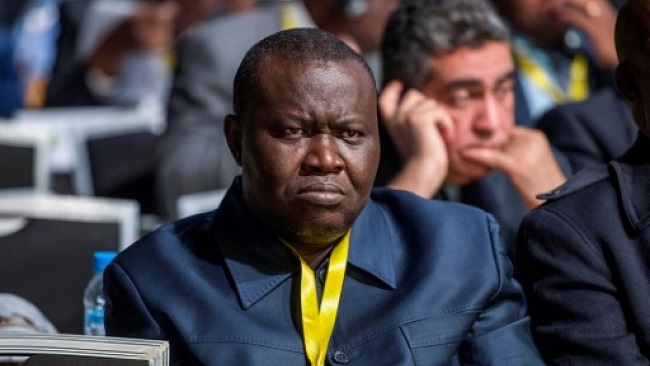Top African football official at the International Criminal Court
A top African football official faced judges at the International Criminal Court Friday, with his lawyer complaining his “dignity was not respected” during his arrest and extradition from France.
Patrice-Edouard Ngaissona who sits on the board of the Confederation of African Football, is charged with coordinating so-called anti-Balaka militia which emerged after civil war broke out in the Central African Republic in 2013.
Flanked by ICC security guards, Ngaissona, 51, appeared before a three-judge bench at The Hague-based court’s headquarters where judges informed him of his rights.
The ICC suspects Ngaissona of being the “most senior leader and the national general coordinator of the anti-Balaka” and therefore responsible for crimes in several parts of the country.
The alleged crimes include murder, torture, mutilation, intentionally targeting and displacing civilians, pillaging, and enlisting child soldiers.
– ‘Dignity not respected’ –
His lawyer Eric Plouvier told judges “we have reservations” in connection with Ngaissona’s detention and transfer from Paris, since his arrest on December 12.
This included being arrested despite having a diplomatic passport designating him as head of the Central African Football Federation.
Plouvier added that French gendarmes tried to question his client without a lawyer and that Ngaissona was a diabetic who did not receive the necessary medication while he was in detention.
He was transferred from Paris to the Netherlands and paraded “in handcuffs”, Plouvier said. “His rights to dignity were not respected.”
But presiding Judge Antoine Kesia-Mbe Mindua cut short the lawyer saying “we are not going to be talking about French institutions”.
Mindua then postponed the case to June 18 when a formal hearing to confirm the charges will be held.
The official will remain in custody at the ICC’s nearby detention unit.
– ‘Not a warlord’ –
The former CAR sports minister was arrested by France last month on an ICC arrest warrant, and he was transferred to the Dutch-based tribunal on Wednesday.
Ngaissona has denied the charges, telling a French court a week after his arrest: “I was a spokesman who brought peace to the Central African Republic and not a warlord.”
The ICC said Ngaissona was extradited “pursuant to an ICC arrest warrant for crimes against humanity and war crimes allegedly committed in the Central African Republic.”
Ngaissona, who is head of the CAR’s football association, was elected to the executive board of the CAF general assembly in February.
The militia he was allegedly involved with were set up to defend Christian communities from mostly Muslim rebels during the conflict in his country. The militia are accused of a host of human rights abuses including mass killings and mutilations.
Two anti-Balaka groups said after his arrest that they were withdrawing from a disarmament programme.
Former colonial power France sent 2,000 troops to help stabilise the conflict-torn CAR in 2013 and attempted to detain Ngaissona a year later during an operation in his fiefdom in the north of the capital Bangui.
In 2015 Ngaissona was barred from running in presidential elections over concerns about his role in the violence.
He was elected to a CAF board seat last year representing eight central African nations. The CAF said his candidacy respected “strict statutory criteria” but noted the body did not have an ethics committee.
Ngaissona’s arrest last year came just weeks after another suspected militia leader — Alfred Yekatom, known as Rambo — was detained in the Central African Republic and transferred to The Hague.
The ICC has launched investigations into at least eight African countries since its establishment in 2002, including several into the CAR violence. But prosecutors have suffered a series of setbacks in recent months.
In 2018, the ICC overturned the conviction of former Congolese vice president Jean-Pierre Bemba, for war crimes committed by his private army in the CAR in 2002-2003.
Last week, ICC judges acquitted former Ivory Coast president Laurent Gbagbo over a deadly wave of post-election violence. He remains in detention awaiting the result of a prosecution appeal.
AFP





